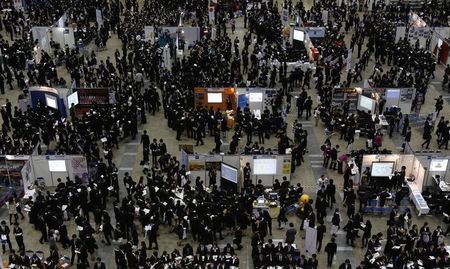TOKYO (Reuters) - Japan's economy continues to recover despite a surprise slide into recession in the third quarter, the government said in its overall economic assessment in November, but cut its view on the labour market to reflect a blow to demand from a sales tax hike.
The government's economic report on Tuesday followed two consecutive months of downgrades to the overall assessment as consumer spending and factory output struggled more than expected after the April tax increase.
Japanese Prime Minister Shinzo Abe has called a snap election next month to seek a fresh mandate after delaying a second sales tax hike, but his party could lose seats as many households say they are not benefiting from his policies.
"The economy remains in recovery even though consumption and some other parts of the economy are weak," the Cabinet Office said in its monthly economic report.
Recent gains in labour demand have paused, but the job market overall is improving, the Cabinet Office said. This was a downgrade from last month when the government said the labour market is clearly improving.
The jobs-to-applicants ratio fell in September from levels not seen in 22 years and the number of new jobs available is starting to decline, which led to the downgrade, according to a Cabinet Office official.
Abe has repeatedly argued that a tightening labour market is one sign that his policies of massive monetary easing, spending and regulatory reforms, known as "Abenomics," are working, so the downgrade could be a source of concern.
The Cabinet Office also turned a little more cautious about future conditions due to declines in consumer sentiment and cautious business confidence.
Policymakers were taken aback after data last week showed the economy fell into recession in the third quarter as the sales tax hike to 8 percent from 5 percent clobbered consumer spending and chilled broader economic growth.
The economy is expected to resume growing in the current quarter, but there is still a lingering sense that Abe's drive to end deflation and shift growth into a higher gear has not produced enough results after two years in office.

The Bank of Japan left monetary policy unchanged last week, but there are concerns its surprise expansion of monetary easing last month is still not enough to guide inflation to its 2 percent price target as growth has consistently missed expectations.
(Reporting by Stanley White; Editing by Shri Navaratnam)